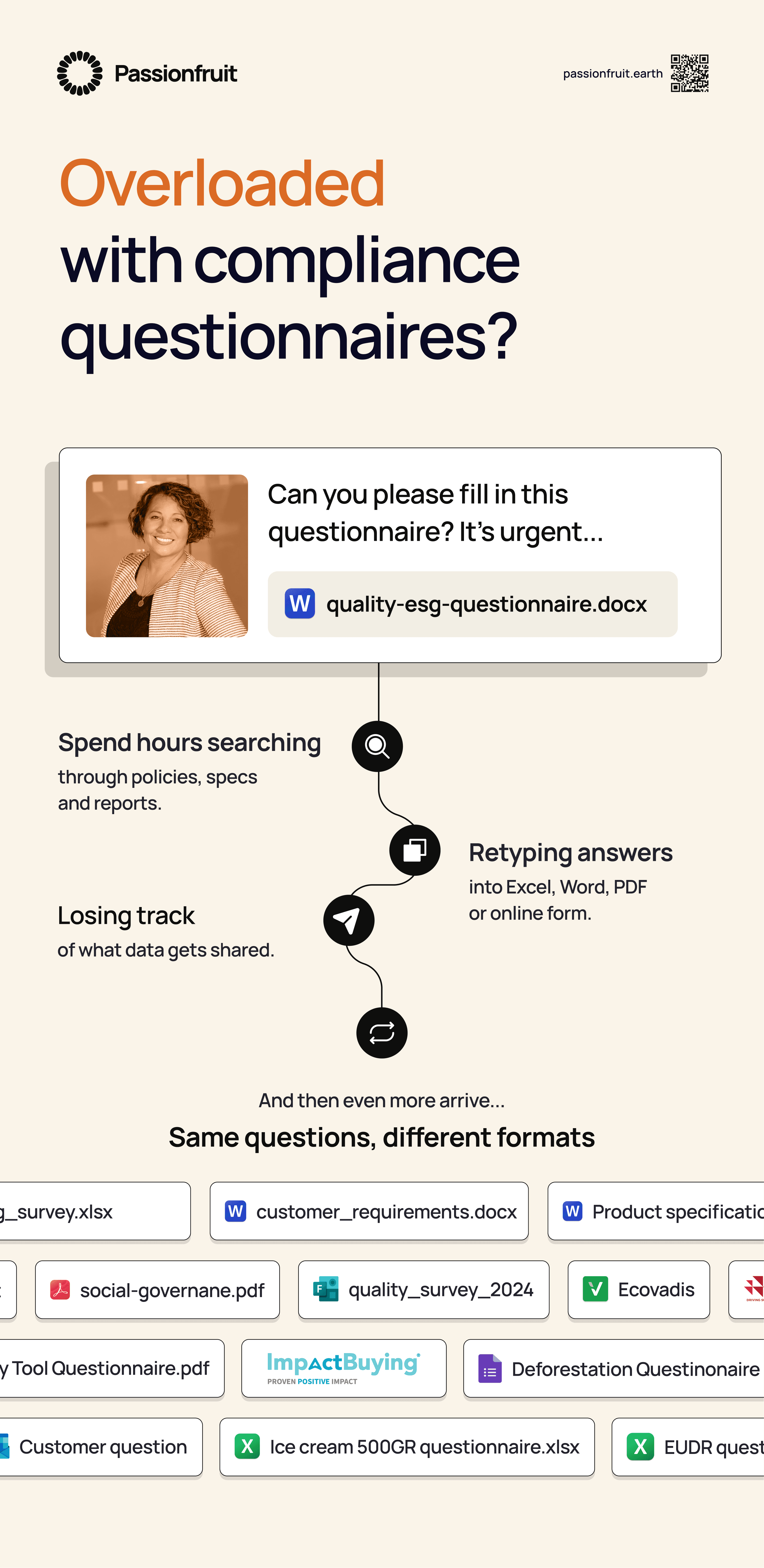Wednesday, November 27, 2024
Overwhelmed by sustainability questionnaires in the food industry? Discover how automation simplifies compliance, streamlines reporting, and eliminates repetitive tasks, freeing your team to focus on what matters most

Maikel Fontein
Nov 27, 2024
5
min
Picture this: It’s Monday morning, and your inbox is already flooded with customer questionnaires. One asks for sustainability metrics in Excel, another demands a detailed PDF on your sourcing practices, and a third requires you to upload answers into their online portal with specific formatting. By the time you’ve sorted through them all, you realize it’s not even lunchtime.
Sound familiar? You’re not alone. This scenario plays out daily for companies in the food industry, where sustainability, quality, and compliance teams are increasingly overwhelmed by the influx of questionnaires—from major customers, regulatory bodies, and stakeholders. The questions keep coming, and while many of them are the same, each one is formatted differently, creating a logistical nightmare.
But what if there was a way to streamline this process? What if you could automate those repetitive tasks and finally break free from the cycle of reformatting, retyping, and hunting for data? The answer: automation.
The Growing Challenge of Questionnaire Overload in the Food Industry
As the food industry faces growing pressure to meet sustainability and regulatory requirements, companies are finding themselves buried in a sea of questionnaires. Sustainability reports, food safety audits, carbon footprint data, and ethical sourcing details—each one needs to be delivered in a format that fits the customer’s needs.
The Problem You're Facing
80% of the questions are the same, but they always need to be presented in different formats.
Customers want more detailed answers and they want them more often.
Data is scattered across different departments, making it hard to pull consistent answers.
This is especially evident in the food industry. For example, major food companies often require sustainability data from suppliers to ensure ethical sourcing and track carbon emissions. These questions may come in different forms—one retailer may ask for this information in an Excel sheet, while a government body might require a PDF format to comply with legal standards.
But despite the different formats and channels, the core data remains the same—Your company’s policies, packaging information, energy usage or quality procedures
Passionfruit centralizes data from across your departments, ensuring every questionnaire is consistent, accurate, and ready for any format—whether it’s an Excel sheet, a PDF, or an online portal upload.
A Day in the Life: Stuck in the Loop of Repetitive Tasks
Let’s break it down with a typical scenario:
Your food company has been asked to provide sustainability data for a major grocery chain. They send a detailed questionnaire asking about your sourcing practices, waste reduction efforts, and carbon footprint.
You have the data—but it’s scattered across different systems. Your sustainability team has one report, the quality team has another, and the purchasing team tracks different metrics. The answers are somewhere, but it takes time to dig them out.
Now, you need to take that data and format it according to the customer’s specifications. This means manually adjusting columns in Excel, retyping answers, and copying and pasting into a PDF template.
And don’t forget that by the end of the day, you’ll have another set of questionnaires from different customers, all requiring slightly different answers and formats.
This isn’t just frustrating; it’s time-consuming and prone to mistakes. In an industry where precision and accuracy matter—whether it’s food safety certifications or environmental impact reporting—small errors can cost you valuable time and resources.

Instead of spending hours adjusting formats or retyping data, Passionfruit enables your team to complete these tasks in minutes. With its trial period, you can experience this efficiency firsthand
The Limits of Human Intelligence: Why Automation is Crucial
Human intelligence can only handle so much. As the food industry continues to deal with increasing customer demands and regulatory requirements, we’re reaching the point where it’s no longer feasible to rely solely on manual processes. Computers can way faster and better find the exact, most recent information through a pile of policies and documents. Humans can spend some time reviewing and finetuning, but foremost on making impact. Computers can then type it over in the right format. no human need for that.
Think about it: The volume of questionnaires from retailers, regulators, and stakeholders in the food industry is increasing at a rate that far exceeds what any individual or team can process manually. Whether it’s annual supplier surveys from customers or yearly certifcation audits, it’s clear we’ve reached a tipping point.
For industries like food and beverage, where demand continue to rise, Passionfruit is an essential tool for manage compliance and prove trust.
This is where automation becomes not just helpful, but essential. Automation can relieve your team from the burdens of repetitive data entry and reformatting, helping them focus on higher-value tasks like data analysis, strategy, and business growth.
Step 1: Organizing the Inflow of Requests
The first step in managing the overload of questionnaires is to get a handle on the inflow of requests. In the food industry, you likely receive forms from multiple channels—whether it’s through email, customer portals, or even paper forms that need to be scanned and digitized.
Centralized Inbox for All Incoming Requests
Set up a centralized email address or file-sharing platform, like SharePoint, that automatically collects all customer questionnaires and internal requests. This helps you keep track of which forms are pending and which are complete.
For example, if you’re a supplier to a major grocery chain, you might receive a sustainability questionnaire asking for data on packaging waste, water use, and energy consumption. By having all your incoming requests stored in a single location, your team can quickly assign tasks, track progress, and avoid duplication of effort.
Tagging and Categorizing Requests
Once the requests are centralized, categorize and tag them according to their urgency and type. This could include labels like “customer questionnaire,” “regulatory report,” or “internal sustainability check.” This simple system helps prioritize tasks and ensures that no request is missed, whether it’s an annual report for a major retailer or a quarterly audit for a local regulatory body.
Step 2: Tracking and Managing FAQs
Given that 80% of the questions are the same across different questionnaires, it makes sense to create a live FAQ document that can be easily updated. This document will become a central hub for your team to access quick, accurate answers to recurring questions.
Building the FAQ for Food Industry Sustainability
The FAQ should include common questions like:
What is your company’s carbon footprint for the last year?
Can you provide data on your sustainable packaging initiatives?
What percentage of your suppliers are certified organic or Fair Trade?
Each question should be paired with the most current, approved answer and, when necessary, links to source documents like sustainability reports or data from your suppliers.
For example, if a food distributor asks for your food safety certifications and packaging waste data, your FAQ document should include pre-approved answers, such as your current packaging recycling rate, your carbon footprint metrics, or the sustainability certifications held by your suppliers.
Using This FAQ in Daily Operations
When a new questionnaire arrives, your team quickly references the answer library or other applicable documents to gather the most relevant and up-to-date answers. Instead of wasting time searching for information or hunting through multiple systems, they’ll have the data ready at their fingertips.
"Passionfruit analyses your policies, documents, and earlier answers to deliver the best response for each questionnaire”.
Step 3: Automating the Process
Now that your team is organized and has access to an FAQ document, the next step is to automate the repetitive tasks. Automation allows you to speed up the process of answering questionnaires, ensuring that answers are consistent, accurate, and quickly formatted.
Centralized Data Management in Food Industry Sustainability
Automation tools like Passionfruit can centralize your key ESG, quality, and compliance information needed to answer compliance questions and questionnaires. Instead of searching across spreadsheets, emails, and scattered reports, all your data is gathered in one place, ready to be pulled for any questionnaire.
For instance, if a customer asks for your carbon emissions data, Passionfruit can instantly generate the relevant answer, pulling the most up-to-date data from your systems.
Automated Formatting and Distribution
Automation doesn’t just help you gather the right data—it also formats it automatically. Whether you need to submit the data in an Excel file, PDF, or upload it to an online portal, automation tools like Passionfruit can ensure that all your answers are delivered in the correct format, every time.
Let’s say your company is part of a sustainable seafood supply chain, and a retailer requests your latest carbon emissions and supply chain transparency data in Excel. With automation, you can instantly generate and send an accurately formatted Excel sheet with the required data, without ever touching a spreadsheet.
"Passionfruit automates answering customer questions and questionnaires and responds in whatever format your customers requests”
The Future: Automation Beyond Human Limits
As the food industry continues to face rising pressure for detailed sustainability data and compliance reporting, automation becomes a critical solution. By centralizing data, automating formatting, and streamlining workflows, food companies can save valuable time, reduce errors, and ensure their answers are always up-to-date and consistent.
Automation isn’t just a luxury—it’s a necessity in today’s fast-paced, data-driven world. By embracing automation, you free your team to focus on higher-level strategic work, like identifying sustainability opportunities, enhancing supplier relationships, and driving innovation.
So, the next time you're staring at a stack of questionnaires, remember: automation is the way forward. It’s time to stop retyping and start automating.




